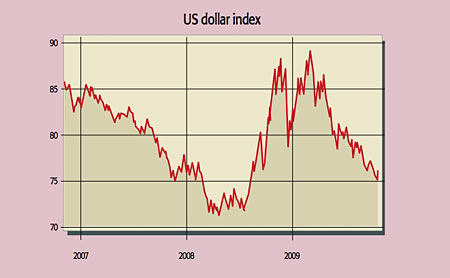Get the latest financial news, insights and expert analysis from our award-winning MoneyWeek team, to help you understand what really matters when it comes to your finances.
You are now subscribed
Your newsletter sign-up was successful
Want to add more newsletters?

Twice daily
MoneyWeek
Get the latest financial news, insights and expert analysis from our award-winning MoneyWeek team, to help you understand what really matters when it comes to your finances.

Four times a week
Look After My Bills
Sign up to our free money-saving newsletter, filled with the latest news and expert advice to help you find the best tips and deals for managing your bills. Start saving today!
"It's dj vu all over again," says Ron Coby on Minyanville.com. In late 2007, as the credit bubble peaked, markets looked pretty much as they do now: the dollar was on the slide, oil hit a high for the year and emerging markets were rocketing. And then, as now, the patterns in markets largely boiled down to cheap money.
This time round, money has been very cheap indeed, thanks to rock-bottom interest rates and quantitative easing (printed money). Central bankers' cash has been "frantically seeking a home" because most banks don't want to lend, says Gillian Tett in the FT. So virtually all risky assets are rallying. The rebounds in some debt and derivative markets have been nothing short of "stunning".
The recovery in global risk appetite, and all the money printing by the Federal Reserve, have led to a falling dollar. But as emerging currencies rise against the greenback, "the prices of too many financial assets" in emerging markets are "bubbling", says Ian Campbell on Breakingviews. Equities in Peru and Indonesia have risen by 139% and 112% this year. A stronger currency draws yet more investment into financial markets and makes exports less competitive. It doesn't help that China's currency the yuan is tied to the dollar, meaning China maintains its competitiveness.
MoneyWeek
Subscribe to MoneyWeek today and get your first six magazine issues absolutely FREE

Sign up to Money Morning
Don't miss the latest investment and personal finances news, market analysis, plus money-saving tips with our free twice-daily newsletter
Don't miss the latest investment and personal finances news, market analysis, plus money-saving tips with our free twice-daily newsletter

Brazil even felt forced to impose capital controls last week after its stockmarket had surged and the real had gained 36% against the dollar this year. Brazil could have tried to "calm things down" with higher interest rates, but that would have attracted yet more capital.
The upshot of all this is that "the global economy's distortions deflated developed economies, robust emerging ones and super-inflated assets almost everywhere risk getting worse", says Campbell. The danger is "another round of intense financial instability".
It also bodes ill that in just six months the mood in some quarters has swung from fear to "euphoria", says Tett. She cites an email from a retired banker close to the markets saying that traders are being as reckless as ever. "Any sense of control is being chucked out of the window. [Was last year] just a dress rehearsal for the crash when this bubble bursts?"
Get the latest financial news, insights and expert analysis from our award-winning MoneyWeek team, to help you understand what really matters when it comes to your finances.
MoneyWeek is written by a team of experienced and award-winning journalists, plus expert columnists. As well as daily digital news and features, MoneyWeek also publishes a weekly magazine, covering investing and personal finance. From share tips, pensions, gold to practical investment tips - we provide a round-up to help you make money and keep it.
-
 New PM Sanae Takaichi has a mandate and a plan to boost Japan's economy
New PM Sanae Takaichi has a mandate and a plan to boost Japan's economyOpinion Markets applauded new prime minister Sanae Takaichi’s victory – and Japan's economy and stockmarket have further to climb, says Merryn Somerset Webb
-
 Plan 2 student loans: a tax on aspiration?
Plan 2 student loans: a tax on aspiration?The Plan 2 student loan system is not only unfair, but introduces perverse incentives that act as a brake on growth and productivity. Change is overdue, says Simon Wilson

